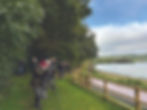Avian influenza, what do I do? If you find one dead bird of prey, 3 or more dead gulls or wild fowl, 5 or more dead birds of any species: MORE INFORMATION HERE
Founded in 1929, the West Midland Bird Club is the heartbeat of birdwatching in Staffordshire, Warwickshire, Worcestershire, and the West Midlands
We're dedicated to bird conservation, research, and creating a thriving community of bird enthusiasts. We are a non-profit charity organisation committed to studying and preserving bird populations in our region. Join us in our mission to protect and conserve these beautiful creatures for future generations.
All the photographs on this site were taken by our members - many on WMBC reserves reflecting the birds, habitats, and moments that inspire us.









Discover the wonders of nature at our eight reserves: Belvide, Blithfield, Gailey, Grimley, Harborne, Ladywalk, Patsull and Wildgoose each offering unique experiences and insights into bird life.
Dive into detailed reserve pages, blogs, and research projects on our site. Join us as an Inclusive Member for exclusive access and benefits. Explore membership options to start your adventure.
Select the reserve you'd like to discover from the menu above.
WMBC in numbers
90+
Bird species protected
96
Years of conservation efforts
100k+
Volunteer hours each year
8
Private reserves
_edited.jpg)



Discover the beauty of birds
.jpg)
.jpg)
.jpg)
.jpg)
Send us your snowy bird photos to go on our gallery

_edited_edited.jpg)
_edited.jpg)

Explore our Reserves and Branches


.jpg)
.jpg)
Volunteer and Get Involved
.jpg)
Annual Report

The Birds of Staffordshire, Warwickshire, Worcestershire and the West Midlands.
The Annual Report is a captivating showcase of regional bird life, chronicling rare sightings and conservation efforts. It details significant sightings, including firsts for the region, and explores the impact of weather on bird movements.
Winging It—WMBC News
Here's your go-to spot for the very latest in bird sightings, photography, and noteworthy activities from around the club. Stay tuned here for real-time insights and snapshots from our community.
Join Us

Become a member
As a WMBC member, you get access to our reserves, invitations to indoor and outdoor birdwatching activities, our quarterly newsletter, and the annual bird report and much more. Enjoy bird photography, see rare species, and connect with fellow bird enthusiasts in our vibrant community.





















